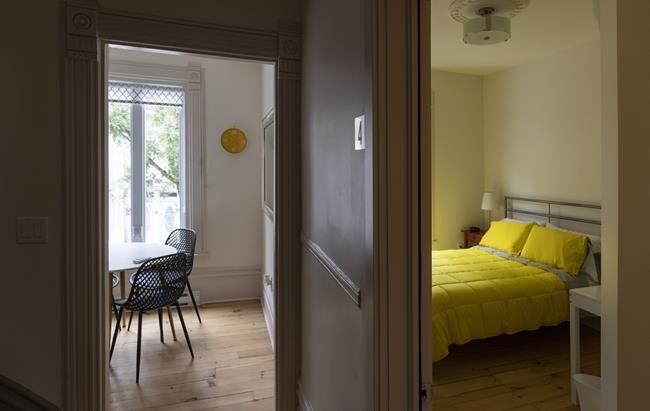MONTREAL — Rooming or boarding houses are regaining favour with some Canadian cities as a way to offset a lack of affordable homes, but experts warn there are pitfalls to the once-popular form of urban housing.
On Tuesday, Montreal executive committee member Benoit Dorais told reporters that the city was applying its right of first refusal to purchase about 100 privately owned rooming houses, in which a person rents a single private room, and shares amenities such as bathrooms or kitchens. The move means the city has the right to match an offer to purchase them if they come for sale.
He said Montreal had already purchased four of the homes and was looking to buy more, describing them as "the principle solution to fight homelessness."
"Generally this is what you can afford, and that's why it's the last step before you're going in the street," he said.
Dorais was at the unveiling of a new rooming house that will become home for 20 vulnerable women at risk of homelessness. The building, which will be run by women's shelter Chez Doris, features single rooms with cheerful, bright quilts on the beds, private bathrooms and several shared kitchens and sitting rooms.
The former inn was purchased at a price of $2.6 million and renovated thanks to $5 million in federal funding, as well as support from the city, private donors and the province, which will subsidize rent.
Montreal isn't the only city taking a new look at rooming houses, after decades of allowing their numbers to decline.
In an email, the City of Vancouver said the number of privately owned single-occupancy units dropped by 23 per cent between 2019 and 2023. That drop was offset by the addition of new non-market housing and government purchases of private rooming houses or hotels.
"Replacement of (single-room occupancy) with self-contained social housing is the priority for the City of Vancouver," the city said. "However, given the ongoing homelessness crisis and the unmet demand for low-income singles housing, we continue to rely on SRO housing as a housing of last resort."
Toronto city council late last year adopted a housing action plan that includes legalizing rooming houses across the city by 2024. A new bylaw to come into effect at the same time sets out standards, regulatory oversight and enforcement and licensing rules, the city said in an email.
A spokesman for the City of Winnipeg said the city was "supportive" of rooming houses and single-room-occupancy hotels as an affordable housing option, "provided they are meeting zoning and safety regulations."
Jill Grant, a professor emeritus of planning at Dalhousie University in Halifax, says the renewed attention on rooming houses is a good thing. "It's the recognition, at long last, that single people with very low incomes don't have many housing options," she said in an interview.
Grant says rooming houses were popular in the early part of the 20th century but declined after the Second World War as governments increasingly focused on home ownership.
In the 1980s and 1990s, concerns over their safety led cities to impose harsher regulations and licensing requirements, which led to many being closed or demolished, while the recent rise in home values had led owners to sell or convert them to more lucrative forms of housing, she said.
Jino Distasio, a professor of urban geography at the University of Winnipeg, says rooming houses have always been "contentious" for governments, who need to balance a need for affordable housing with the often problematic conditions found in the homes.
He said rooming houses are often located in old buildings and tenants regularly lack protections, such as leases. Many operate illicitly — meaning they aren't inspected — and are overcrowded, which can lead to violence.
"Often you'll see illegal rooming houses operating without meeting basic building code standards, and that, as we know, across this country has caused significant harm in terms of fire and other kinds of challenges," he said.
Cities such as Montreal and Vancouver are trying to eliminate the more problematic elements of rooming houses by purchasing the privately owned ones and converting them to social housing or turning them over to community groups. Some places, including Winnipeg, fund programs to help landlords repair their properties.
In Montreal, the operator of the new rooming house for women is hiring social workers and a security guard — the kind of support that Grant says is key to avoiding conflicts with neighbours and ensuring tenant well-being.
She said rooming houses can be part of a successful "housing first" approach that helps get people off the streets, then helps them address other issues such as substance abuse and health challenges through counselling and other supports.
"If people can get into housing, then they can start to get a handle on the other issues that they're dealing with," she said.
Distasio said rooming houses can be appropriate, with the right set of regulations to prevent crowding and ensure safety, but he said he isn't sure they should be prioritized. While acknowledging the need to fight homelessness, he cautioned against accepting the notion that a 100-square-foot room constitutes adequate housing.
"I think we should be striving for more than a rooming house," he said. "I think we should be striving for more than a single-room-occupancy hotel as a basic form of shelter."
This report by The Canadian Press was first published July 1, 2023.
Morgan Lowrie, The Canadian Press




